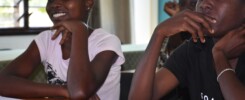This year’s theme focuses on “Literacy teaching and learning in the COVID_19 crisis and beyond,” especially on the role of educators and the changing methods of teaching.
The recent COVID_19 crisis has disrupted the learning of youth and adults globally, with most learning institutions and programs having being suspended. We are cognizant of the fact that more youth and adults in the world especially the most vulnerable groups, still cannot access education and literacy programmes. Literacy is a fundamental human right and the basis for any individual’s ability to learn. It is essential for social and human development and provides individuals with skills to transform their lives and society.
As we celebrate the day, we pledge our commitment towards promoting access to quality education and learning opportunities to girls and young women. As an organization, we managed to develop interventions that have ensured our literacy programmes continue to reach our beneficiaries during the pandemic. Dubbed “Keeping learning Alive,” we have disseminated online revision materials to our beneficiaries through their parents’ phones, as well as in-person during our community outreaches. Our staff have also been calling the girls and sending them SMS to check up on their learning progress as well as providing them access to online learning opportunities including tv and radio programs.
The issue of literacy is a key component of the UN’s Sustainable Development Goals and the UN’s 2030 Agenda for Sustainable Development. The UN’s Sustainable Development Agenda, adopted by world leaders in September 2015, promotes universal access to quality education and learning opportunities throughout people’s lives. Sustainable Development Goal 4 has as one of its targets ensuring all young people achieve literacy and numeracy and that adults, who lack these skills are given the opportunity to acquire them.
The International Literacy Day 2020, therefore, provides an opportunity to reflect on the impact of the COVID-19 crisis on youth and adult literacy, the lessons learnt and how we can we effectively position youth and adult literacy learning in global and national responses, and in strategies for the recovery and resilience-building phase.
DID YOU KNOW?
- 773 million adults and young people lack basic literacy skills;
- 617 million children and adolescents are not achieving minimum proficiency levels in reading and mathematics;
- During the initial phase of the pandemic, schools were closed disrupting the education of 62.3 per cent of the world’s student population of 1.09 billion;
- Adult literacy and education were absent in initial education response plans, therefore many youth and adults with no or low literacy skills have had limited access to life-saving information.
#Education #SDGs #Goal4 #LiteracyMatters #InternationalLiteracyDay2020 #LiteracyDay2020

